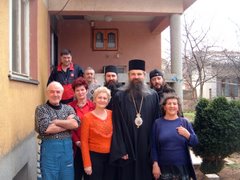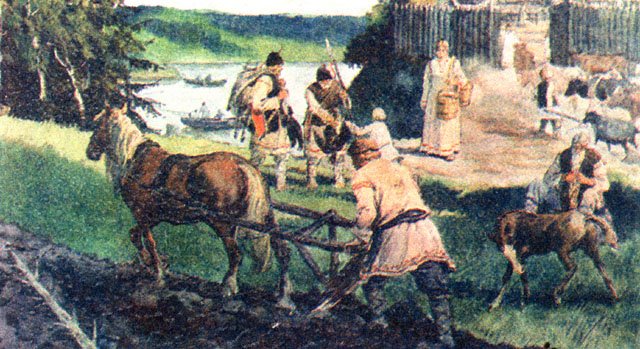The Africanization of the Balkans
The Africanization of the BalkansThe lessons of Zimbabwe are lost in darkest Kosovo
EuroPress ReviewBy Denis BoylesNovember 30, 2007
The report in Le Figaro that a trio of today's big powers - including Russia, the U.S., and the European Union - was at loggerheads in the Balkans, has a certain cold air of familiarity about it, right down to the annoying Serb nationalists at the center of it all.
The sudden chill between Russia and what we can now again call "the West" is the result of the collapse of talks between the Serbs and the Kosovars a couple of days ago. Their negotiations were supposed to be the "last chance" at working out a "settlement" - ostensibly of what relationship the Serbian province of Kosovo should have with Belgrade. In reality, the two sides were negotiating the terms of Serbian surrender demanded by the Kosovar terrorists they had once fought. The Serbs were willing to continue to come up with something, as the IHT report today, but most think it would be an empty exercise: On December 11, the international community will impose a "solution" and grant Kosovo the independence its leaders demand. The Serbs will be scarred and Russia might not like it, but they both had their chance to do something about it eight years ago, and they missed it. Serbia was being run by a dangerous buffoon and the Russians were broke.
Now the Russians are rich as czars and everybody's worried about what they might do - including, I guess, the Russians: Le Figaro's reporter says the Russian foreign minister is "very alarmed" at the consequences of forcing Serbia to accept Kosovo's independence. That Russian alarm was matched by American concern. Our negotiator, Frank Wisner, told Le Monde that "tensions are obvious." Sorting out the Balkans should be a snap. The countries there are little and cute. But the "Balkan powder keg" is a local trademark, and for good cause.
The place is a mess; for starters, the air war against Serbia left affairs in a state of perilous improvisation. The feebleness of Russia a decade ago is what permitted the bulldozer diplomacy of heavy-handed men like Richard Holbrooke, whose famous Dayton agreement criminalized not only Serbia's actual criminals, including especially Slobdan Milosevic, but also the entire Serbian nation. As the architect of America's diplomacy in the Balkans, Holbrooke left a legacy of lean-tos and shanties. The Dayton Accords ended the conflict in Bosnia by enshrining fractured politics in a state dominated by Muslims, and where today, consequently, "hundreds of mujahadeen fighters.are successfully spreading their fundamentalist Islamist views" at the expense of Bosnian Serbs, according to Der Spiegel.
As in Kosovo, the international community will eventually force a settlement on the Bosnian Serbs. In fact, tensions will rise this weekend, as the Islamic presidency seeks to impose reforms that will eliminate the semi-autonomy Dayton had granted the Serbs, Muslims, and Catholics, in favor of the Muslim majority. The resulting Islamic state may well drift further toward the Wahhabism now firmly taking root there.
Kosovo may travel a similar path path. During the last eight years of often ineffective NATO occupation, Kosovar Serbs have been effectively cleansed from all but the very northernmost districts. This constitutes an ironic end to a conflict that only came to America's attention when Milosevic's army tried to solve a backyard terrorism problem by driving Albanian Kosovars, including members of the Marxist-inspired Islamic Kosovo Liberation Army, back to Albania (a country that desperately didn't want them). The goal of the KLA, of course, was to cleanse Kosovo of Serbs, as newspapers and magazines - including NRO and The New York Times, in dispatches like this one and others from the 1990s - occasionally noted. The Republican in the White House may think the KLA is heroic now, but in 1999, the party felt differently, as this Senate Republican Policy Committee report makes clear.
The current Kosovo government is populated by the former terrorist leaders mentioned in that report, including Hashim Thaci, whose radical party defeated a more moderate one, and carried the elections that were held in the province on November 17. According to the BBC, Thaci, who's married to an Albanian mafia princess (Pristina's a long way from Queens), has long been associated with racketeering in Kosovo. He was also widely known as a ruthless opponent of the late Ibrahim Rugova, Kosovo's popular moderate leader who died in 2006. Wary of the ex-KLA leaders' ambitions, and maybe knowing a few things we don't, most Albanians avoided the election (turnout was around 45-percent, and Kosovar Serbs boycotted the vote entirely.)
But an independent Kosovo under the leadership of former KLA commanders is apparently a done deal, no matter what the Russians want. The statements from the Kosovar leadership imply the threat of violence if they are not appeased. Violence against whom? The few remaining Kosovar Serbs? The Independent's ill-formed "big question" is "Would the Balkans flare up again if Kosovo declared independence?" That's the wrong question, of course. The question is will violence flare up again if they don't declare independence? The Kosovars may not want to make the mistake the Serbs made. The "war" in Kosovo was widely supported in the U.S., largely on the basis of genuine outrage at what Milosevic was doing, and if the press made mistakes in reporting, as some claim they may have in Radac, for example, there's no escaping the fact that in Kosovo, the Serbs deserved to lose.
And lose the Serbs did. It was a neat, Clintonian kind of war, led by a general only Clinton could really love, Wesley Clark (Peter J. Boyer's entertaining New Yorker profile from 2003 is here), in which civilians may have been bombed in Belgrade but our casualty list was fairly short. Some wondered why we were cluster-bombing people in a country that had been our ally in two wars (at no small cost, either) instead of boycotting them into compliance with civilized norms, and exactly how much punishment Serbia deserves. But the larger question is why we were there at all. Kosovo became America's problem only because the Europeans were no better at solving Balkan crises than they are at negotiating with Iranians. As Ed Morrissey recently observed in his Captain's Quarters blog, "[Kosovo] is, and should always have been, a strictly European affair."
Maybe, but when there's a spliff of moral outrage to be passed around, nobody wants to miss the buzz. So enthusiasm in the U.S. for an independent Kosovo comes from right and left. William Finnegan's lively piece in the current New Yorker captures the mood about Kosovo in blue-state America perhaps better than it does the mood in Kosovo itself, judging from those election turnouts. But The Wall Street Journal also has demanded quick independence for Kosovo and lately has taken to giving Kosovo's current prime minister, Agim Ceku, op-ed space not just once, but twice in three months (but each time inviting James Jatras of the lonely American Council for Kosovo to write a letter to the editor, the most recent of which is here). Richard Holbrooke, one of the most authoritative American advocates of independence for Kosovo, endorsed Thaci, telling the Sueddeutsche Zeitung that he had known the chap "for about ten years" and had found that he had a "remarkable" way about him. No doubt.
Holbrooke and others are irritated by suspicions that an Islamic Kosovo might pose a security risk. They shrug off concerns by claiming, rightly, that most Kosovars are secular Muslims and that the place will never be an al-Qaeda base or a haven for extremists. But they say that about Bosnia, too. Besides, what was Assistant U.S. Attorney Brian Frazier telling that jury in the Jose Padilla trial? Something, Reuters reported, about "al Qaeda-affiliated groups" fighting in Kosovo in the '90s? I guess they were our allies, back in the day. Any friend of Thaci's.
If 55-percent of the Kosovo citizens couldn't bring themselves to vote at all, how rushed are they for independence? Maybe they realize that independence isn't as simple as a slogan, and that they'll have to live with whatever happens next. And maybe they too think there may be other ways to go, as this Christian Science Monitor article proposes. Kosovo's neighbors, including Macedonia, Montenegro, and Albania itself, are deeply concerned about the implications of an independent Kosovo, and the whole idea of a "greater Albania." It's Europe's Kurdistan in some ways.
The Balkan crisis recalls more than just Sarajevo, 1914. It also smacks of Salisbury, 1980, and a dozen other African capitals upon achieving an expeditious, politically convenient independence, in which something bad was replaced by something arguably worse. The common complaint about colonialism wasn't how it began but how it ended: When it was time to go, the retreating colonial power gave the keys to the guy with the most guns and ran for it, rather than trying to take the time to fight for a more careful solution that required careful thought, and saved lots of lives. Thus, the history of post-colonial Africa is littered with murderous tyrants, the most notorious of which is Zimbabwe's Robert Mugabe (a recent NRO piece describing his early support from an unthinking international community is here). Kosovo's not a colony and southeastern Europe isn't Africa. But in Zimbabwe, we enthroned a known criminal. The result was much, much more criminality. Do we really want to do the same in the Balkans?

















